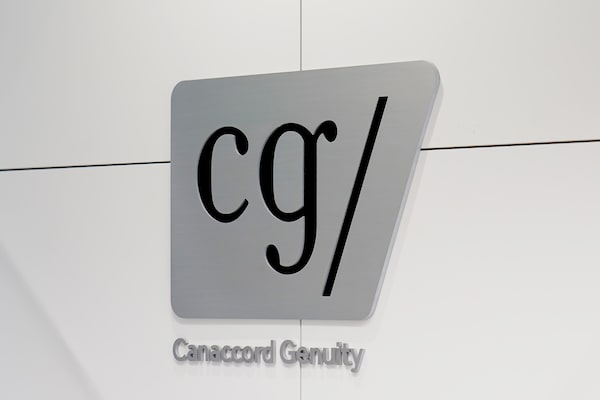
Late last week, Canaccord Genuity announced it would borrow a total of $110-million by issuing convertible debentures to two institutional investors.Staff/The Canadian Press
Executives and top producers at Canaccord Genuity Group Inc. are buying nearly 10 per cent of the investment dealer’s shares using money borrowed by the company, an unusual arrangement that has spurred chatter of a creeping management buyout despite the signing of a two-year standstill last summer.
Late last week, Canaccord Genuity CF-T announced it would borrow a total of $110-million by issuing convertible debentures to two institutional investors, $80-million of which will be lent to senior employees to buy nearly 10 million of the company’s shares. The remaining $30-million will be used for general corporate purposes.
Justifying the arrangement, Canaccord Genuity said the share purchases will increase and diversify its employee ownership, and also help to retain and attract exceptional performers, because they’ll have more skin in the game. Canaccord Genuity’s shares are trading at 2012 levels because capital markets deal flow has dried up, and the last time there was a deal drought the company struggled to retain talent.
Yet the way the share purchases are being financed, coupled with the secrecy around the two institutional investors, has spurred speculation about additional motivations. For one, it remains unclear why Canaccord Genuity is borrowing the money and lending it to senior employees, rather than having them fund the share purchases on their own. Personal loans to employees were prohibited in the United States two decades ago, and, while still legal in Canada, are rare here.
There are also questions about long-term goals, considering management tried to buy the company for $1.1-billion last year but was rebuffed by Canaccord Genuity’s board. The fight turned ugly after the board accused management of seizing on a depressed valuation, and four top directors ended up resigning, citing an “irreparable” relationship.
Ultimately, the management team let its bid expire because of an unnamed regulatory issue and signed a two-year truce with the reconstituted board. But executives still seemed interested in having more control over the dealer in the future.
To this end, the new financing and subsequent stock purchases provide management with “greater influence and incentive to pursue value creating initiatives, which could include the sale of assets (most likely U.K. wealth management) or a second attempt at a go-private transaction,” Cormark Securities analyst Jeff Fenwick wrote in a note to clients.
After the new transaction closes, Canaccord Genuity employees will own roughly 40 per cent of the company’s outstanding stock.
But it remains unclear why Canaccord Genuity itself is borrowing the money for these purchases, and not the employees. It is possible the current arrangement helps the shares get purchased at one time into a permanent capital vehicle, as opposed to each executive owning shares that could be bought and sold at any time, but the company declined to comment for this story.
The terms for loans to employees who purchase shares also remain confidential, though the debt is full recourse, which means the company could seize employee assets if a loan isn’t repaid. For shareholders, a key risk is that employees won’t be able to repay their loans if the company’s share price continues to fall, something that recently transpired at BBTV Holdings Inc. and prompted the company to forgive a $2-million loan to its chief executive officer.
As well, Canaccord Genuity has not disclosed what interest rate employees who borrow money to buy stock will have to pay, other than to say the loans will bear interest at rates prescribed by local tax authorities in each jurisdiction in which participants reside and will be repaid using future compensation.
What has come to light, however, is that employees will be buying stock from existing institutional shareholders. “No new shares are being issued to facilitate this transaction,” Raymond James analyst Stephen Boland wrote in a note to clients.
While the identities of these shareholders remain a secret, Cormark’s Mr. Fenwick wrote that he suspects SKKY Capital “is likely the key player involved, as it had held 8.8 per cent of shares outstanding and was a key backer of the proposed management takeover last year.”
Canaccord has said it is not authorized to identify the investors.
 Tim Kiladze
Tim Kiladze